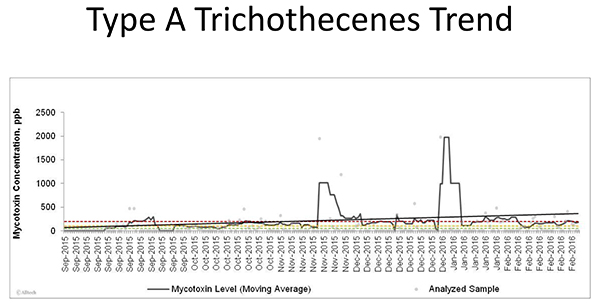Has Type A made its way into your TMR? |
|
|
|
If dairy producers thought their corn silage quality was top notch when they packed it away after the 2015 harvest, they may want to check again. Since Alltech’s North America Harvest Analysis in December, additional testing through the Alltech 37+® mycotoxin analysis program is now indicating Type A Trichothecene mycotoxins are on the rise. 
According to Dr. Max Hawkins, Alltech Mycotoxin Management team nutritionist, Type A Trichothecenes, predominantly known as the T-2 group, have shown an increase in levels present from 33.18 parts per billion (ppb) in September to 86.38 ppb in February. Type A Trichothecenes have been present in 46 percent of all samples of corn silage that have been submitted to the 37+ program. “The levels are higher than in years past, and exactly why that may be is difficult to identify. There may be many causes,” said Hawkins. Type A Trichothecenes are formed from Fusarium molds. Fusariums require moisture levels at or above 70 percent humidity as well as oxygen and a temperature range that can include cool days and nights to cool nights and hot days. Corn plants stressed from insect damage or birds, plant disease, wind and hail are always a concern for mold proliferation. Corn silages that are drier, poorly packed and allow greater oxygen penetration are also at a greater risk. The ingestion of Type A Trichothecenes can impact dry matter intake, weight gain, milk production, transition issues, haemorrhages, estrus, conception rates, embryo survival and mortality. The Alltech 37+ mycotoxin analysis tested 239 total corn silage samples from Sept.1, 2015 to March 8, 2016. The average sample contained 5.28 mycotoxins. Type B Trichothecenes and Fusaric acid were present in more than 90 percent of the samples, while fumonisins have been found in over 70 percent of the samples. The levels of these mycotoxin groups have remained relatively constant at a moderate-to-high risk since harvest. Type A Trichothecene toxins, however, have shown a steady increase since 2016. “The increasing level of Type A Trichothecenes, along with the steadily higher level of Type B Trichothecenes and Fusaric acid, creates a combination of mycotoxins that can easily increase the risk of corn silage that is being included in to the TMR,” said Hawkins. Hawkins suggests testing grains and feed for moisture, mold count, yeast count and mycotoxins. Ensure corn silage is properly stored and implement good face management practices and feeding conditions. When all possible preventative measures have been taken, the use of a mycotoxin mitigating substance (or a sequestering agent) in the feed can help reduce or prevent the negative effects mycotoxins have on the animal and additionally improve rumen function, gut health and integrity. The most effective agents are those that can help combat the risk of multiple mycotoxin contamination. “If mycotoxins are an issue, your herd will be the first to signal,” said Hawkins. “If animals are not performing to their potential or unexplained symptoms persist, you may want to consider your corn silage quality.”
The latest data from the Alltech 37+® mycotoxin anaylsis program indicates that Type A Trichothecenes, predominantly known as the T-2 group, are on the rise. Type A Trichothecenes’ levels have increased from 33.18 parts per billion (ppb) in September to 86.38 ppb in February. Resources: For the latest information on mycotoxin-related news and research, analytical testing through the Alltech 37+® mycotoxin analysis program and complete field-to-feed out management solutions, visit Knowmycotoxins.com. About Alltech:
The company’s guiding ACE principle seeks to develop solutions that are safe for the Animal, Consumer and the Environment and is actively supported by more than 4,700 team members worldwide. Alltech is the only privately-held company among the top five animal health companies in the world. This is a source of competitive advantage, which allows Alltech to adapt quickly to emerging customer needs and to stay focused on advanced innovation and long-term objectives. Headquartered just outside of Lexington, Kentucky, USA, Alltech has a strong presence in all regions of the world. For further information, visit www.alltech.com/news. |

